Supply chain challenges have dealt another blow to new van registrations, with April recording a 29.1% drop in new van sales.
A total of 21,597 LCVs were registered in April, according to Society of Motor Manufacturers and Traders (SMMT) data, almost half the number that were recorded for March.
According to the SMMT, the decline in registrations in April is amplified by comparison with 2021, which saw the highest total for the month since records began. This year is still 12.2% below pre-pandemic 2019.
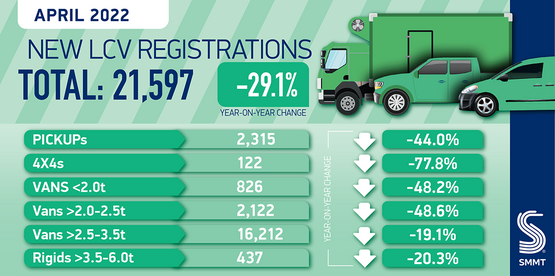
Despite demand being strong across all segments, supply chain pressures locally and globally, including shortages of semiconductors, hampered deliveries.
Newly registered large vans, which comprise more than two thirds of the LCV market, totalled 16,212 units, down 19.1% compared with a year ago, as the segment’s market share increased by nine percentage points to 75.1%. This is due in part to more significant declines in registrations of medium-sized vans – those weighing greater than 2.0 tonnes to 2.5 tonnes – by 48.6%, and small vans – weighing equal to or less than two tonnes – by 48.2%, as components shortages restricted supply.
Sales of pickups, meanwhile, declined by 44.0%, while 4x4 registrations dropped by 77.8%.
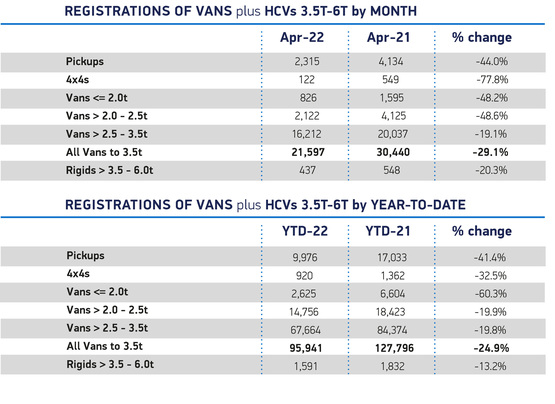 As manufacturers continue to invest in and bring new electric van models to the market, registrations of these vehicles increased by 52.7% year-on-year to 919 units – representing one in 24 new vans joining the road. While electric LCV uptake continues to grow, the market is some way behind passenger cars in transitioning to electric, so policies that incentivise operators to make the switch will be essential to meet ambitious decarbonisation targets.
As manufacturers continue to invest in and bring new electric van models to the market, registrations of these vehicles increased by 52.7% year-on-year to 919 units – representing one in 24 new vans joining the road. While electric LCV uptake continues to grow, the market is some way behind passenger cars in transitioning to electric, so policies that incentivise operators to make the switch will be essential to meet ambitious decarbonisation targets.
Andy Hill, strategic LCV fleet engineering consultant at Lex Autolease, said: “Despite ongoing supply chain and delivery disruption continuing to hamper the growth of the light commercial vehicle market, registrations of these vehicles increased by 52.7% year-on-year.
“It’s encouraging to see battery electric vans continue to attract interest as businesses accelerate their electrification plans. While transitioning to an electric fleet remains vital for a sustainable future, commercial vehicles still need to be fit for purpose and legally compliant – making vehicle selection a key priority. That’s why we need to see policymakers and manufacturers continue to work together to help build a zero-emission van market that has both a widespread choice of vehicles and the necessary charging infrastructure.”
In light of ongoing supply chain challenges, SMMT has revised its outlook for new van registrations downwards from 363,000 units to 328,000 in 2022. As a result, this year’s market is anticipated to fall by 7.7% on 2021, with BEVs expected to account for 6.3% of registrations.
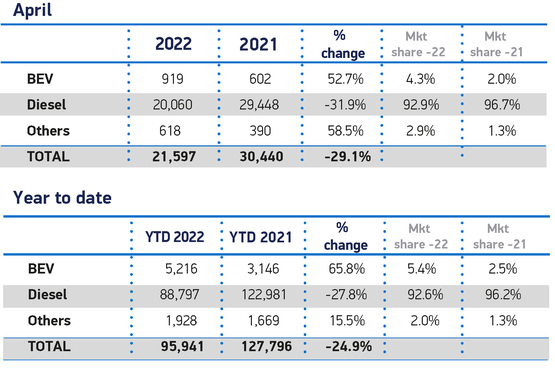
Mike Hawes, SMMT Chief Executive, said, “Despite the global supply pressures on the UK’s light commercial vehicle sector, manufacturers are prioritising the most popular models, while investing in electric options where demand is slowly but steadily growing. Constrained supply, however, does mean that 2022’s new van market is expected to be down on last year’s bumper uptake.
“Even so, while market conditions remain challenging for van operators across the UK, now is the time for those looking to renew their fleets to put their orders in, as interest rates remain historically low and an increasing range of fuel efficient and electrified models are now available.”
The Ford Transit Custom remains the UK best-selling van, achieving 3,357 registrations in April. It was followed by the larger Transit.
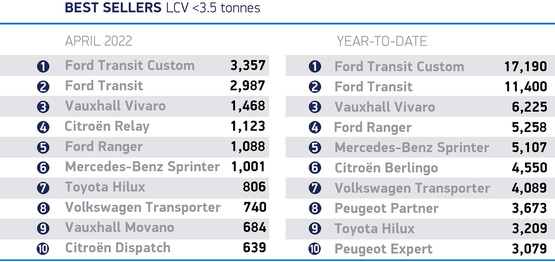





















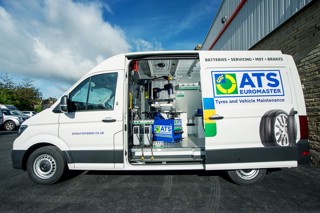
Login to comment
Comments
No comments have been made yet.